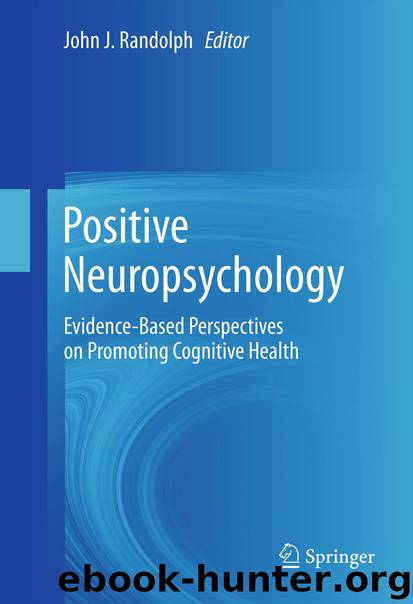Positive Neuropsychology by John J. Randolph

Author:John J. Randolph
Language: eng
Format: epub
Publisher: Springer New York, New York, NY
Training in formal problem-solving strategies and their application to everyday situations and IADLs
Practice guideline
Group-based interventions for executive and problem-solving deficits
Practice option
Note. Adapted from Cicerone et al. (2011) with permission.
While Cicerone et al. reviewed studies of cognitive rehabilitative treatments in TBI and stroke, there is evidence that executive functions can be promoted effectively in other neuropsychiatric populations. For example, Flavia, Stampatori, Zanotti, Parrinello, and Capra (2010) examined computerized training of attention, information processing, and planning in multiple sclerosis (MS) patients with low disability and a stable clinical course. After 3 months of treatment (3 h per week), patients in the treatment group showed improved PASAT and WCST performance relative to baseline but no generalization to other cognitive abilities. Another recent study (placebo-controlled) also found improved executive and verbal memory functioning in MS patients after executive-specific rehabilitation (Fink et al., 2010). A meta-analysis found similar findings in individuals with age-related mild cognitive impairment (Li et al., 2011).
Further, cognitive-behavioral treatment of ADHD has been found to improve attentional and executive abilities in everyday life and may have applications to patients with other neuropsychiatric conditions. For example, in a study by Safren et al. (2005), adults with ADHD were randomized to medication-only treatment or treatment with medication and cognitive behavioral therapy (CBT) specifically designed for ADHD. Their CBT version included a specific focus on promoting various executive functions including organization and planning (e.g., training in use of a notebook with calendar and task lists), problem solving (e.g., breaking tasks into manageable components), and using external cues to improve task compliance and reduce distractibility (e.g., using a “distraction pad” for distracting thoughts during task completion). CBT participants showed significant reductions in ADHD symptoms based on self and independent evaluator reports compared to those only receiving medication treatment. Other recent randomized and controlled CBT interventions with significant executive function components have been shown to improve ADHD symptoms in patients already on medication (Emilsson et al., 2011; Safren et al., 2010).
General behavioral activation can also be recommended in a therapeutic context to promote EFs. As discussed in other chapters in this volume, various intellectual, social, and physical activities are known to have a positive impact on cognition. Exercise, in particular, can promote cognition across the lifespan, with what appears to be selective benefit for the executive functions. For example, in a meta-analytic study, Colcombe and Kramer (2003) found that exercise had a considerably stronger (positive) effect on executive abilities than on other cognitive skills. Discussion of exercise is not always a component of neuropsychological evaluations or feedback sessions but perhaps should be based on these findings.
Download
This site does not store any files on its server. We only index and link to content provided by other sites. Please contact the content providers to delete copyright contents if any and email us, we'll remove relevant links or contents immediately.
When Breath Becomes Air by Paul Kalanithi(7264)
Why We Sleep: Unlocking the Power of Sleep and Dreams by Matthew Walker(5644)
Paper Towns by Green John(4169)
The Immortal Life of Henrietta Lacks by Rebecca Skloot(3826)
The Sports Rules Book by Human Kinetics(3589)
Dynamic Alignment Through Imagery by Eric Franklin(3489)
ACSM's Complete Guide to Fitness & Health by ACSM(3469)
Kaplan MCAT Organic Chemistry Review: Created for MCAT 2015 (Kaplan Test Prep) by Kaplan(3423)
Introduction to Kinesiology by Shirl J. Hoffman(3301)
Livewired by David Eagleman(3123)
The River of Consciousness by Oliver Sacks(2992)
Alchemy and Alchemists by C. J. S. Thompson(2912)
The Death of the Heart by Elizabeth Bowen(2902)
Descartes' Error by Antonio Damasio(2733)
Bad Pharma by Ben Goldacre(2730)
Kaplan MCAT Behavioral Sciences Review: Created for MCAT 2015 (Kaplan Test Prep) by Kaplan(2492)
The Gene: An Intimate History by Siddhartha Mukherjee(2492)
The Fate of Rome: Climate, Disease, and the End of an Empire (The Princeton History of the Ancient World) by Kyle Harper(2436)
The Emperor of All Maladies: A Biography of Cancer by Siddhartha Mukherjee(2431)
